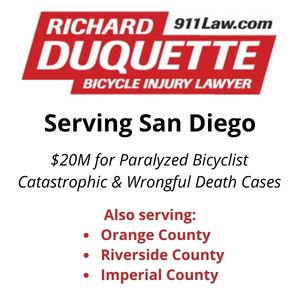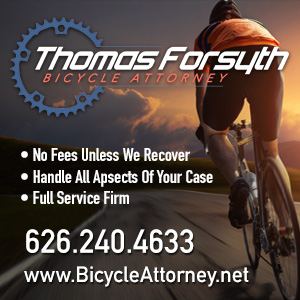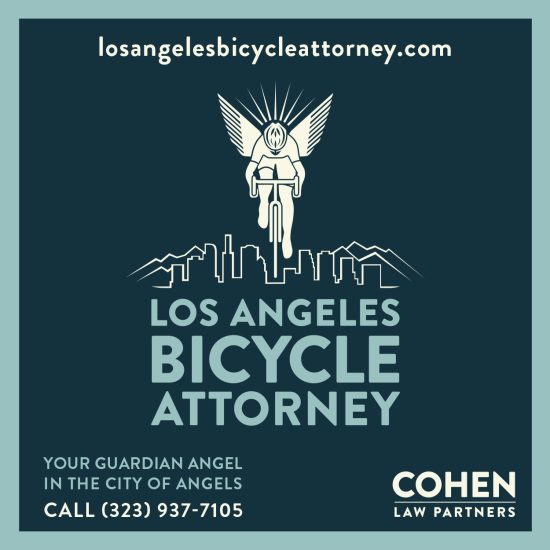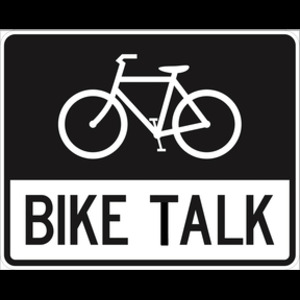Bikes Have Rights™
By James L. Pocrass, Esq.
Pocrass & De Los Reyes LLP
I settled a Malibu bike collision case in which the driver of a motor vehicle made a left turn into the cyclist. The accident happened at dusk; it was not dark out yet. The police report states that the cyclist was cited for “unsafe speed conditions” because the cyclist was wearing all black.
When I was taking the sheriff’s deposition, I asked him why he cited the cyclist for wearing all black. He told me he asked another officer at the station who told him that because the cyclist was wearing all black, he was going too fast for the conditions.
The cyclist was going 15 – 20 mph! This conclusion is absolutely wrong. What the cyclist was wearing had nothing to with “unsafe speed conditions” (VC 22350).
More recently I represented a woman who suffered serious personal injuries in a pedestrian collision. My client was crossing in the crosswalk, with the light, when she was struck by a motor vehicle. When I took the deposition of the police officer I asked him why he didn’t take a witness statement from the friend who was walking next to her at the time of the collision. His answer was that as a friend of the victim he figured the witness would be biased and would just back up whatever the victim said. Regardless, it was the officer’s responsibility to take statements from all witnesses.
I have represented hundreds of cyclists. The one constant in all of these cases is the police report. I’d estimate that 60 percent of the time, the police reports I see blame the cyclist for the collision.
So is it worth getting a police report? Simply, yes.
Though police officers are often biased against cyclists, they usually get the facts of a bike collision correct. Such details as: the time, place, weather, what direction each participant was going and where they were located when the accident happened, contact information for witnesses, confirmation of insurance, and any physical evidence at the scene, is usually recorded correctly.
It is the police officer’s conclusion that is typically wrong. Though I would much rather police officers would lose their cyclist bias, filing a police report is still beneficial to your legal case and to your insurance claim because it sets out in writing the basic facts.
If the police refuse to come to the scene or they come to the scene but refuse to take a police report, I suggest you go to the nearest police station and file a report yourself.
Police reports with tainted conclusions or incorrect facts also need to be addressed. You can go to the police station and file a Supplemental Statement. This allows you to correct the facts and is attached to the original report. Though the police won’t change their police report, at least your version or the correct facts will be in the report.
The filing of a biased or incorrect police report will make the handling of your case or insurance claim more difficult, but the police report and the opinions and conclusions of the police officer are not admissible in court since in most instances the officer did not see the accident themselves. This makes most police reports hearsay and not admitted into evidence.
Where police reports have an effect is on the insurance company. When the insurance company reads the police report and accepts the officer’s conclusions, it may refuse to settle your case or offer you much less compensation than which you are entitled.
The result is that we have to file a lawsuit, gather evidence, and take the police officer’s deposition to prove the officer was wrong. Frequently it is during or after the deposition stage that the insurance company will offer to settle the case to avoid going to court.
Now a days a number of cities – including the City of Los Angeles – will not send an officer to the scene of the collision if there are no injuries (and you should NEVER comment on injuries or guilt to ANYONE, including a police officer).
If you are in a collision and the police refuse to come to the scene, but you want a police report taken, you will need to go to the nearest police department to file a report as I mention above. Getting the facts on the record is always helpful.
Remember, filing a police report does not mean you have to file a legal case. It can assist you in collecting compensation for damages you incurred in the bike collision and, should you decide to take legal action later, a police report will be of value to your bike collision lawyer as he is pursuing your case.
*California Vehicle Code 21200: A person riding a bicycle or operating a pedicab upon a highway has all the rights and is subject to all the provisions applicable to the driver of a vehicle. . .
For more than 25 years, Jim Pocrass has represented people who were seriously injured, or families who lost a loved one in a wrongful death, due to the carelessness or negligence of another. Jim is repeatedly named to Best Lawyers in America and to Southern California Super Lawyers lists for the outstanding results he consistently achieves for his clients. Having represented hundreds of cyclists during his career, and Jim’s own interest in cycling, have resulted in him becoming a bicycle advocate. He is a board member of the Los Angeles County Bicycle Coalition. For a free, no-obligation consultation, contact Jim Pocrass at 310.550.9050 or at info@pocrass.com.








*sigh* no, bikes do not have rights. Cars do not have rights. People have rights. This anthromorpization of inanimate objects continues to further the divide between cyclists, pedestrians and motorists. We are all people, and we all have rights, specifically rights of movement along public highways and thoroughfares. Maybe it will start to get better when the public starts seeing vehicle operators as people, and not just “bikes vs. cars” and so forth.
Good advice and well appreciated. Having dealt with hundreds of accident and police reports, they are chock full of errors and are usually slanted or biased in one way or another. Hopefully no one here will need this information. A wallet card or bike frame/helmet decal would he helpful with this information condensed into a fold out laminated blood-resistant tract for emergency use with room for blood type, next of kin, and emergency contact information.
Helpful advice, but what concerns me greatly is this statement: “I have represented hundreds of cyclists.”
Thanks for the guest post, Jim. Out of curiosity to those who are familiar with these crashes- do police often misunderstand CVC21202 or 21208 and blame the cyclist for not riding “far enough” to the right?